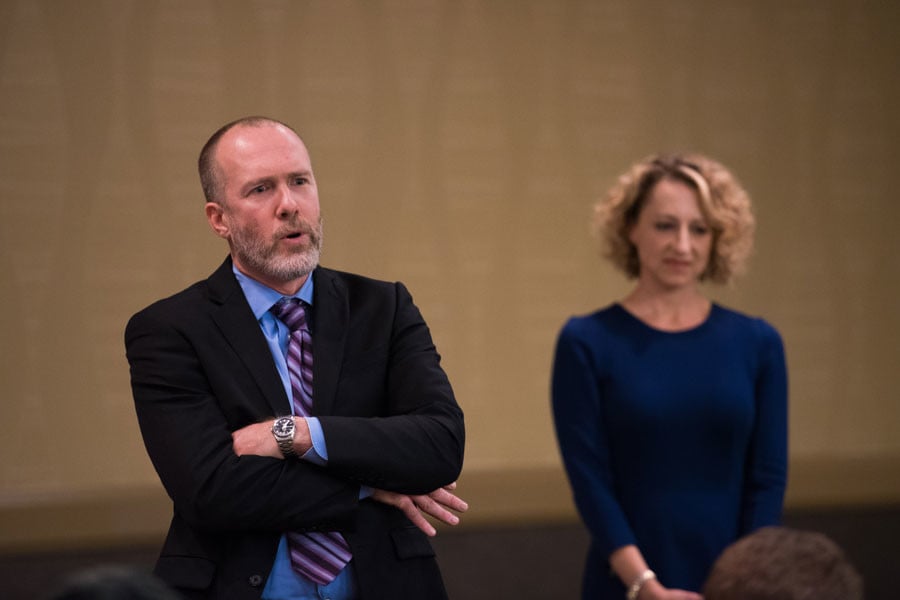Physician compliance presents roadblock for Evanston residents seeking medical marijuana
Daniel Tian/Daily Senior Staffer
Pharmacannis officials Teddy Scott (left) and Norah Scott present to community members Wednesday night at a public meeting about the incoming medical marijuana dispensary. The dispensary is set to open Monday at 1804 Maple Ave.
November 5, 2015
Days before Evanston’s medical marijuana dispensary opens its doors, community members expressed concerns about doctor compliance and cost at a public meeting Wednesday.
After 10 months of planning, Pharmacannis Health & Wellness Center is set to open Monday in a storefront at 1804 Maple Ave. Pharmacannis co-CEO Teddy Scott discussed at the meeting that Illinois’ system surrounding medical marijuana is much stricter than other states, causing problems for patient access.
Nearly 40 people attended the meeting Wednesday at downtown Evanston’s Hilton Garden Inn, 1818 Maple Ave., led by Ald. Peter Braithwaite (2nd) and dispensary officials.
The state determined in February that Pharmacannis’ application to operate in Illinois was the highest-scoring in the region, later authorizing the company to take steps to open a dispensary in Evanston.
“It’s going to be a healthcare facility run like a pharmaceutical company,” Scott said, “We need to make sure it’s not being abused.”
Several people at the meeting were patients with one of the 39 diseases outlined by the Illinois Department of Public Health that qualify patients to receive medical marijuana. Nancy Schwartz, an Evanston resident who is considering using medical marijuana, said her doctor isn’t comfortable prescribing cannabis.
“Some doctors still have their reservations about medical cannabis,” Schwartz told The Daily. “That means people who need this, who are suffering, don’t have a way to get around their physicians’ views.”
Because Illinois’ medical marijuana pilot program mandates that the doctor and patient have a “bonafide” relationship for the treatment to be prescribed, patients don’t have an option to receive treatment if their current physician isn’t willing to prescribe it. This becomes a problem for patients who have applied for a $70 medical marijuana card and aren’t able to get refunded.
Community members at the meeting also raised concerns that medical marijuana prices may be too high for low-income patients, considering an average patient buys $300 of marijuana a month, according to data from Pharmacannis. Insurers aren’t predicted to cover medical cannabis for another few years, Scott said.
Scott said although the company wants to make products affordable, it needs to keep its costs above “black market” standards so patients aren’t reselling the medical marijuana for a profit.
“Its not as simple as being able to give it out to someone for free,” he said.
Other residents questioned how Evanston police will discern between medical and recreational marijuana. Carrying fewer than 10 grams of marijuana is decriminalized in Evanston, and medical marijuana users can buy up to 2.5 ounces every two weeks with their medical card.
Evanston Police Chief Richard Eddington said mistaken charges shouldn’t be an issue as long as people keep the drug in its prescription bag and do not use it in cars or in public.
“If you’re driving back from the dispensary and you get pulled over, having a medical marijuana prescription doesn’t matter,” Eddington said. “But if the back seat’s full of dope, this is going a different direction.”
Attempting to dispel concerns among community members, Scott said the dispensary will create jobs for locals and is set up to make sure there’s no diversion for fake conditions. The dispensary will provide a needed service for many residents battling cancer and other diseases in the area, he said.
“There are still kinks to be worked out,” he said, “But it’s here. We’ll be working on the problems while providing this service.”
Correction: A previous version of this article misstated the position of a Pharmacannis official and the amount of marijuana people can buy every two weeks. Teddy Scott is the co-CEO. Individuals can buy 2.5 ounces every 14 days. The Daily regrets the errors.
Email: [email protected]
Twitter: @robinlopsahl


